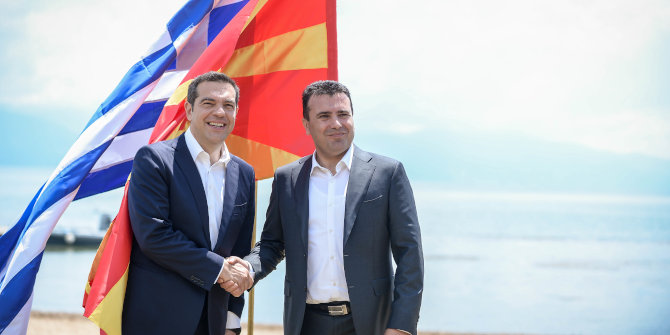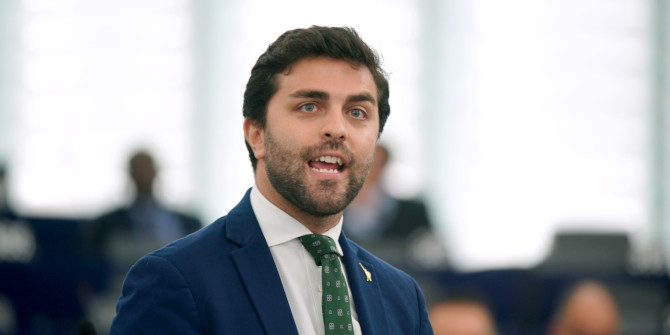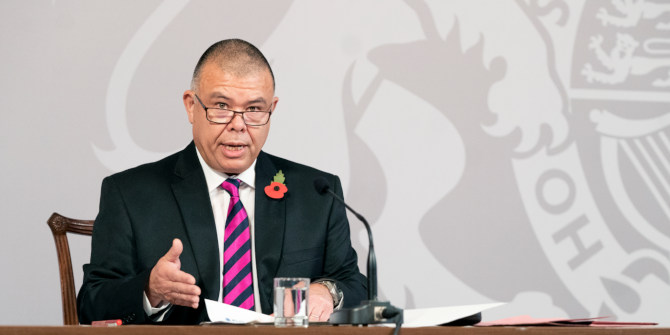 Macedonia is currently experiencing a political crisis, with a wire-tapping scandal prompting large demonstrations from both opponents and supporters of the country’s government. Against the backdrop of the crisis, the northern city of Kumanovo has also experienced deadly clashes that claimed the lives of eight police officers. Dejan Marolov writes that while the nature of the crisis is complex, the EU must take its share of the blame. He argues that with the ongoing naming dispute between Macedonia and Greece effectively closing off the country’s path to European integration, the foundations have been laid for instability which may yet spillover into other parts of the region.
Macedonia is currently experiencing a political crisis, with a wire-tapping scandal prompting large demonstrations from both opponents and supporters of the country’s government. Against the backdrop of the crisis, the northern city of Kumanovo has also experienced deadly clashes that claimed the lives of eight police officers. Dejan Marolov writes that while the nature of the crisis is complex, the EU must take its share of the blame. He argues that with the ongoing naming dispute between Macedonia and Greece effectively closing off the country’s path to European integration, the foundations have been laid for instability which may yet spillover into other parts of the region.
On 8 May the citizens of Kumanovo, alongside the other citizens of the Republic of Macedonia, had experienced an impeccably normal day and peacefully went to sleep. That day in the city everything remained as it had been. The country’s ruling party (VMRO – DPMNE) had held its Congress in Kumanovo a few days earlier and, among other guests, there were also representatives of their coalition partners, the Albanian Democratic Union for Integration (DUI), in attendance.
In addition to the majority Macedonian population in the city, a significant number of Albanians also live in Kumanovo (as well as a number of Serbs). At the local level there are several Albanian councillors, and Albanians are regularly represented at all levels of government, with Albanian Ministers currently in government at the national level. This may give the impression of a relaxed state of inter-ethnic relations and a high level of respect for minority rights. This picture was also evident in 2001, but it was not enough to prevent a conflict erupting between a militant group associated with the Kosovo Liberation Army (KLA) and Macedonian security forces.
Unfortunately, 14 years later, on the morning of 9 May, Kumanovo woke up to another ‘mini war’ within the city itself that lasted two days, with the fighting taking place in a neighbourhood called Divo Naselje. As a result of the conflict, the President of the Republic of Macedonia had to suspend his visit to Russia and come back. During the fighting, 8 policemen were killed and over 30 were wounded, but the paramilitary group was nevertheless defeated. A new KLA group claimed responsibility in a statement.
Macedonia in a state of crisis
The violence did not take place in isolation, but against the backdrop of a much wider political crisis within Macedonia – one of the largest since the country’s independence. In a series of press conferences, Zoran Zaev – the leader of the main opposition party, the Social Democratic Union of Macedonia (SDSM), which has been boycotting the Macedonian parliament since the last election – has released material from a number of recorded phone conversations. This ‘tapping scandal’ has implicated Ministers in the current government led by Prime Minister Nikola Gruevski, the head of the Macedonian secret police, prosecutors, judges, editors, journalists, and even the Prime Minister himself.
The recorded conversations have raised concern over relations between the executive and the judiciary, as well as their influence on the media. The President of the SDSM has demanded the government’s resignation and proposed the creation of a transitional technical government. According to Zaev, the conversations were leaked by patriotic individuals working for the Macedonian services; however Gruevski has claimed the recordings were created, cut and obtained from a foreign service that performed illegal tapping in the country.

Just before the publication of the first of the recordings – which have been labelled ‘bombs’ in the public discourse – the Prime Minister held a press conference, stating that he had received threats from Zaev. The allegation is that Zaev had attempted to blackmail Gruevski by threatening to publicise the recordings unless the Prime Minister agreed to form a technical government. As a result of these charges, Zaev’s passport has been temporarily confiscated.
Of particular significance given the events in Kumanovo, however, is that Zaev has made an announcement indicating one of the upcoming recordings to be publicised will relate to the so called ‘monster case’. This refers to an incident in 2012 where five ethnic-Macedonians were killed, with several ethnic-Albanians/radical Islamists being accused of the killings. The case stirred up strong emotions in the country and Zaev’s announcement was therefore met with concern about a possible new wave of ethnic tensions. As yet, however, this new ‘bomb’ has yet to be made public.
As a result of Zaev’s revelations, several small protests have taken place outside the offices of the country’s public broadcasting organisation, MRT (Macedonian National Radio and Television), the Public Prosecutor’s Office, and government offices. One of the organisers of these protests, former General Stojance Angelov, stated more than a week before the events in Kumanovo that he possessed information indicating the government had paid more than 2 million euros to a group of criminals in Kosovo to stoke tensions in the region of Lipkovo, located next to Kumanovo on the Macedonian-Kosovo border. The claim is that by doing so the government would be able to deflect attention away from the contents of the tapped conversations.
On the other hand, journalist Mirka Velinovska (who often takes a positive line concerning the ruling VMRO – DPMNE) also said prior to the events in Kumanovo that radical actions were being prepared to destabilise the state. The aim of these actions, allegedly, was that under strong international pressure Macedonia would be forced to make concessions in a similar manner to 2001, when the country had to change its own constitution.
Similar views have been expressed by representatives of the ruling party, with Zaev portrayed as a pawn in a larger effort by foreign actors to invalidate the last election and destabilise the country. An incident on 21 April near the village of Gošince on the Macedonian border with Kosovo, where an armed group consisting of 40 members briefly captured a Macedonian border watchtower, has been cited as evidence for both claims.
All this happened before the events in Kumanovo, but what followed exacerbated tensions. Just days after the incident, Sašo Mijalkov, the secret police director, Minister of Interior Gordana Jankulovska, and the Minister of Transport and Communications Mile Janakieski resigned. It remained unclear, at least in the case of the first two, whether the resignations were due to the events in Kumanovo, Zaev’s ‘bombs’, or a simple “refreshing of tired staff” that the Prime Minister had mentioned a few days before the resignations. Two large rallies in Skopje followed: one against and the other in support of the government, with both being very well attended.
The domestic reaction to Kumanovo
The logical question that arises from all of this is what was the real intention of the terrorist group? In an interview given to Kosovo television, Sulejman Osmani (one of the members of the group that, in somewhat suspicious circumstances, managed to escape police the day after his arrest in Kumanovo) stated that the ultimate aim of the group was the creation of an Albanian state within Macedonia, along similar lines to the Republika Srpska in Bosnia and Herzegovina. According to a Ministry of the Interior spokesman, the aim of the group was to attack state institutions. The Prime Minister also evidently believes that the group intended to commit major terrorist attacks against police stations, civilians, sporting events and similar targets.
It should be noted in this context that regardless of the fact that the Albanian population in Macedonia has its own political parties, mayors, councillors, MPs, Ministers, officials in public administration, and police officers; similar demands from other extremist groups have been heard in the past. It should also be noted that the action in Kumanovo led to the death of an ethnic-Albanian policeman. Communications between Ali Ahmeti, the leader of the DUI, and members of the group in Kumanovo have also generated speculation: following numerous rumours about some of those involved being some of his former bodyguards, in a television interview Ahmeti stated that he had been in contact with the group but only to try to negotiate a peaceful surrender.
Nevertheless, the fact that this contact was possible, alongside the implication that members of the group had contact details and felt free to get in touch with the leader of the largest Albanian political party in the country, has raised further questions. Ahmeti also stated that he knew of the group a year ago and tried to deter them from their intentions. This is less strange than it sounds as Ahmeti was directly involved in the 2001 conflict on the side of the militant group that attacked Macedonian security forces – following international pressure, members of the group were subsequently pardoned by the Macedonian Parliament.
An address by Macedonian President Gjorge Ivanov provided yet more drama to this picture. The President stated that the group had been known about since the start of 2015 and that as many as 17 partner agencies of EU member states and NATO had been notified, although all requests for cooperation on prevention measures had proven fruitless. Ivanov also noted that he had repeatedly warned over the years that the status quo with regard to the country’s Euro-Atlantic integration has created a sense of frustration which has made Macedonia vulnerable to attempts at destabilisation.
The international reaction
Undoubtedly, the recent developments in Macedonia have attracted a great deal of attention from outside of the country. Russian Foreign Minister Sergey Lavrov responded by saying that, while it cannot be judged with ultimate confidence, the events in Macedonia have developed in light of the Macedonian government’s decision to avoid joining sanctions against Russia and in an atmosphere of active support for the so called ‘Turkish flow’ pipeline that many oppose, both in Brussels and overseas. German Foreign Minister Frank-Walter Steinmeier, on the other hand, noted after meeting with his Albanian counterpart Ditmir Bushati that “without rapid calming of the situation in Macedonia” there is a threat of destabilisation of the entire region. This is a warning that it is difficult to ignore.
Are such statements, implying as they do the existence of a new kind of cold war on Macedonian territory, accurate? More to the point, where has the EU been during the crisis? Macedonia is a country with official candidate status to join the EU, which means both entities have certain responsibilities and the EU cannot afford to simply ignore recent developments. In fact the EU has attempted, albeit belatedly, to mediate between the government and the opposition in talks first in Brussels, and later in Strasbourg. The nature of these talks, which have been facilitated by MEPs Richard Howitt, Eduard Kukan, and Ivo Vajgl, has been made public, but the full contents of the conversations remain a secret, with neither representatives of the government nor the opposition willing to comment.
Unconfirmed information has recently suggested that the EU has also agreed to send a special envoy to facilitate talks in Skopje. The key issue in this sense is whether a failure of the Macedonian state would constitute a failure for the EU. Undoubtedly, the answer to this question must be ‘yes’ when one considers that the current EU policy of ensuring a stable Macedonia as part of the enlargement process is presently at risk of unravelling completely. This failure is at least partly explained by the fact that the EU has simply left the country to wait at the gates of the EU for far too long.
Macedonia was the first Western Balkan country with which the EU signed a Stabilisation and Association Agreement. This took place as early as 2001 – even before Croatia. Macedonia has been a candidate country for EU membership since 2005, with the European Commission preparing a report on the progress of the country each year. Since 2009, each report has emphasised strengths and weaknesses, but the conclusion is always the same: that the Commission provides a clear recommendation that the country is ready to start accession negotiations.
This recommendation has always been positively assessed by the European Parliament but it has also always been ignored by the member states in the Council. The reason why the EU institutions have not been aligned on this issue are straightforward: the Council, as a political body comprising government ministers of member states, has never been able to act on the recommendation due to opposition from Greece. The Greek government has made it clear that it would use its veto to prevent EU accession negotiations with Macedonia – something that has already been demonstrated when Greece blocked NATO’s membership invitation to Macedonia in 2008.
This opposition remains tied to the Greek demand that Macedonia should alter its constitutional name, although, encouraged by the actions of Greece, Bulgaria has also announced a possible veto unless certain demands are met. However by effectively freezing Macedonia’s integration aspirations on account of the views of one of its members, the EU is now undermining the very stability of the country. A ruling by the International Court of Justice that Greece should not block Macedonia’s attempts at integration on account of the naming issue is also being ignored in this context.
The present crisis in Macedonia has taken place against the backdrop of the country’s inability to secure a clear path to Euro-Atlantic integration. In terms of the wider situation in the Balkans, the region now encompasses Kosovo, which is not recognised by all EU members, has no UN membership and has experienced instability in its northern territories; Serbia, with its ambiguous relationship with NATO and historical closeness with Russia; and a similarly unstable Bosnia and Herzegovina.
The potential for the Macedonian crisis to destabilise the region represents a very real risk. Indeed, if one looked back only a century into history, they would see that the two Balkan wars that were a prelude to the First World War were fought precisely on the territory of Macedonia. Without a solution to the crisis the essence of European Common and Foreign Policy would be put in question: and how will the EU be a global player if it cannot deal with events in its own backyard?
Please read our comments policy before commenting.
Note: This article gives the views of the author, and not the position of EUROPP – European Politics and Policy, nor of the London School of Economics.
Shortened URL for this post: http://bit.ly/1Kw8Eip
_________________________________
 Dejan Marolov – Goce Delcev University
Dejan Marolov – Goce Delcev University
Dejan Marolov is a Professor at Goce Delcev University in Macedonia.






Fyroms past is in Bulgaria. Fyroms future is in Greece. Name change will happen. You cannot have a Slavic and Albanian people claiming a link to greeces history. That is historical distortion. You are what you speak and the Slavs of fyrom speak Bulgarian. This antiquization program needs to be reversed. It’s embarrassing to humanity and to the Slavs of fyrom.